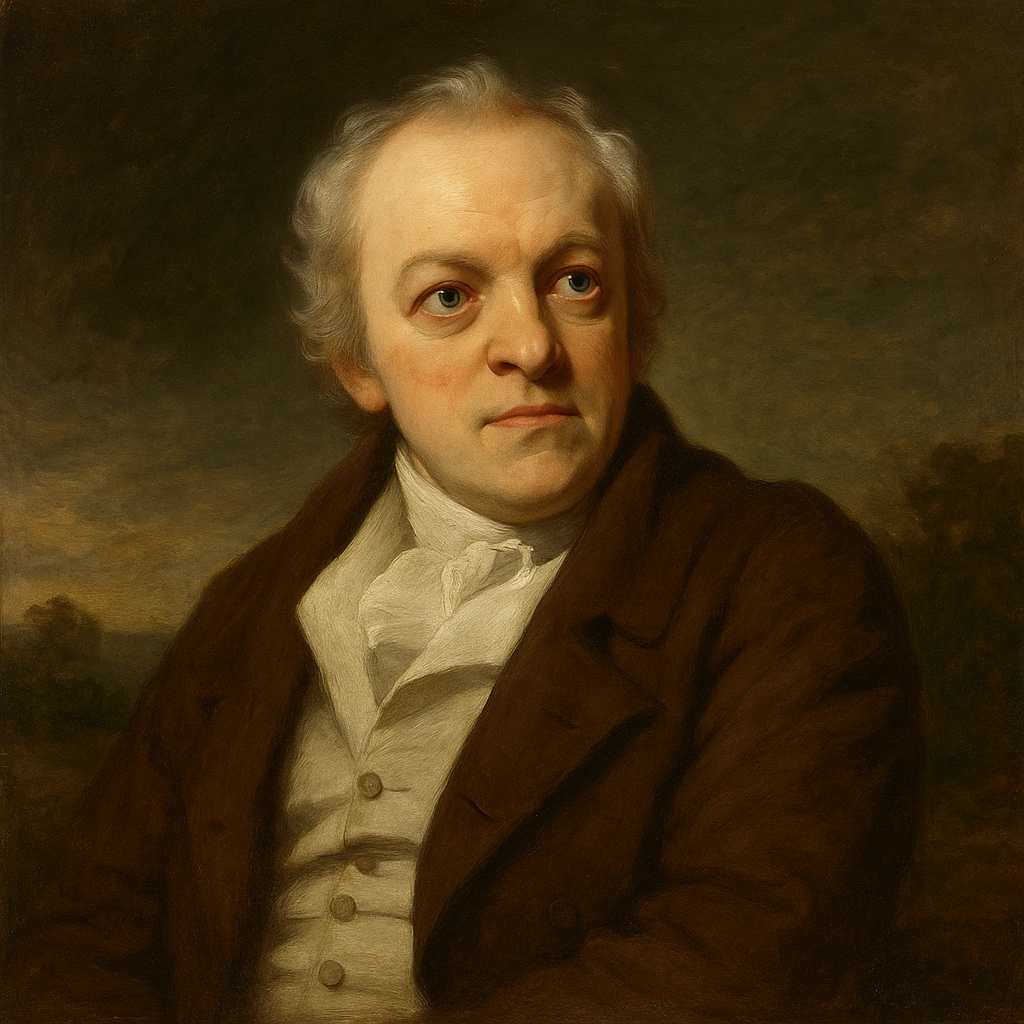The Fly
William Blake
1757 to 1827

Little Fly,
Thy summer's play
My thoughtless hand
Has brushed away.
Am not I
A fly like thee?
Or art not thou
A man like me?
For I dance,
And drink, and sing,
Till some blind hand
Shall brush my wing.
If thought is life
And strength and breath,
And the want
Of thought is death;
Then am I
A happy fly.
If I live,
Or if I die.
William Blake's The Fly
William Blake’s The Fly, a deceptively simple poem from his 1794 collection Songs of Experience, is a profound meditation on mortality, human fragility, and the interconnectedness of all living beings. At first glance, the poem appears to be a fleeting observation—a speaker’s momentary reflection upon accidentally killing a fly. Yet, within its brief lines, Blake weaves a complex philosophical inquiry into the nature of existence, the limits of human perception, and the arbitrary forces that govern life and death. This essay will explore the poem’s thematic depth, its engagement with Enlightenment and Romantic thought, and its masterful use of metaphor and irony to challenge conventional hierarchies between humans and insects.
Historical and Philosophical Context
To fully appreciate The Fly, one must situate it within Blake’s broader intellectual and historical milieu. The late 18th century was a period of radical upheaval—philosophically, politically, and scientifically. The Enlightenment had popularized rationalism and mechanistic views of nature, while the early stirrings of Romanticism sought to reclaim emotion, imagination, and spiritual intuition. Blake, a visionary poet and artist, stood at the crossroads of these movements, critiquing the cold empiricism of his age while embracing a more holistic, even mystical, understanding of existence.
Blake’s Songs of Innocence and Experience (1789-1794) juxtapose two contrasting states of the human soul. The Fly belongs to the Songs of Experience, a collection that grapples with corruption, oppression, and the loss of childlike wonder. Yet, unlike some of the darker poems in this sequence, The Fly adopts a tone of quiet contemplation rather than outright despair. Its philosophical underpinnings resonate with ideas from thinkers like John Locke and David Hume, who questioned the nature of perception, as well as with Blake’s own mystical belief in the divine presence in all things.
Structure and Literary Devices
Blake’s poem is structured in five quatrains, each containing a concise, almost aphoristic statement. The brevity of the lines mirrors the fleeting nature of life itself—both the fly’s and, by extension, the speaker’s. The poem’s language is simple, yet its implications are vast, employing metaphor, rhetorical questioning, and paradoxical reasoning to unsettle the reader’s assumptions.
The opening stanza introduces the central incident:
Little Fly,
Thy summer’s play
My thoughtless hand
Has brushed away.
The casual violence of the act is underscored by the adjective thoughtless—a word that carries moral weight. The speaker’s hand, acting without deliberation, becomes an agent of arbitrary destruction. This moment evokes the biblical notion of human dominion over nature, yet Blake subtly subverts it. The fly’s "summer’s play" suggests vitality and joy, making its destruction all the more poignant.
The second stanza introduces the poem’s central metaphysical question:
Am not I
A fly like thee?
Or art not thou
A man like me?
Here, Blake destabilizes the boundary between human and insect, challenging anthropocentric hierarchies. The rhetorical questions imply a shared vulnerability—both the fly and the man are subject to forces beyond their control. This egalitarian view of life reflects Blake’s broader critique of institutional power, whether religious, political, or scientific, which he saw as imposing false divisions upon existence.
The third stanza extends this analogy:
For I dance,
And drink, and sing,
Till some blind hand
Shall brush my wing.
The parallelism between human and fly becomes explicit: both creatures indulge in life’s pleasures until an unseen force (a "blind hand") intervenes. The phrase blind hand is richly ambiguous—it could signify fate, divine will, or mere chance. Blake often depicted Urizen, his mythological figure of oppressive reason, as a blind old man, suggesting that the "blind hand" may symbolize the cruel, mechanistic logic of the universe as conceived by Enlightenment thinkers.
The fourth stanza introduces a gnomic philosophical proposition:
If thought is life
And strength and breath,
And the want
Of thought is death;
This stanza has been the subject of much critical debate. At one level, it suggests that consciousness (thought) is what defines life, and its absence equates to death. Yet Blake’s phrasing is deliberately paradoxical. If the fly lacks complex thought (as humans understand it), does that mean its death is insignificant? Or does the very act of the speaker pondering the fly’s fate grant it a kind of posthumous life? The lines also echo George Berkeley’s idealism—the philosophical stance that existence is contingent upon perception. If the fly ceases to be perceived, does it, in some sense, cease to be?
The final stanza delivers the poem’s startling conclusion:
Then am I
A happy fly.
If I live,
Or if I die.
The speaker’s identification with the fly reaches its apex. The adjective happy is deeply ironic—flies do not contemplate their own mortality, so in one sense, their ignorance might be bliss. Yet the speaker, as a thinking being, cannot escape such awareness. The last two lines—If I live, / Or if I die.—suggest a radical acceptance of life’s transience. Unlike the anxious human, burdened by the knowledge of death, the fly exists purely in the moment. In this way, Blake inverts traditional moral hierarchies: perhaps it is the fly, not the man, who is truly free.
Themes and Interpretations
1. The Illusion of Human Superiority
Blake’s poem critiques the anthropocentric worldview that places humans above other creatures. By drawing parallels between the fly’s death and human mortality, he exposes the fragility of human pretensions to dominance. The "blind hand" that kills the fly is no different from the forces that govern human fate—war, disease, or divine will. In this sense, The Fly anticipates later ecological and posthumanist thought, challenging the assumption that humans are uniquely significant.
2. The Arbitrariness of Existence
The poem’s central metaphor—the "thoughtless hand"—evokes the randomness of life and death. The fly’s destruction is not a moral event but an accident, underscoring the indifferent mechanics of the universe. Blake’s imagery here aligns with his broader suspicion of rationalist systems that seek to impose order on existence. The "blind hand" may also allude to the deist conception of God as a distant watchmaker, a notion Blake vehemently opposed in favor of a more immanent, passionate divinity.
3. Consciousness and Mortality
The poem’s most haunting implication is that self-awareness may be a curse. The fly, lacking human thought, does not fear death, while the speaker, burdened by cognition, must grapple with existential dread. This tension between ignorance and awareness resonates with Romanticism’s preoccupation with the sublime—the simultaneous terror and awe inspired by the infinite.
4. Comparative Readings
Blake’s The Fly can be fruitfully compared to other works exploring similar themes. In John Donne’s The Flea, the insect becomes a metaphor for intimacy and the fragility of life. In Emily Dickinson’s I heard a Fly buzz—when I died—, the fly symbolizes the banality of death. Blake’s treatment is distinct in its egalitarian vision—he does not use the fly as a mere symbol but elevates it to the level of philosophical subject.
Conclusion: The Poem’s Emotional and Philosophical Impact
The Fly is a masterpiece of economy and depth, encapsulating Blake’s radical vision in just twenty lines. Its power lies in its ability to unsettle—to force the reader into an uncomfortable identification with the insignificant. By collapsing the distance between human and insect, Blake exposes the illusions that sustain human pride. The poem’s final lines, with their serene resignation, offer a paradoxical comfort: if life and death are equally indifferent, perhaps the only freedom lies in accepting that indifference.
In an age increasingly aware of ecological crisis and the limits of human control, The Fly feels strikingly contemporary. It reminds us that all life is fragile, interconnected, and subject to forces beyond comprehension or command. Blake’s genius is to make this revelation not a source of despair, but of strange, unsettling joy—a recognition that in our shared vulnerability, we are never truly alone.
This text was generated by AI and is for reference only. Learn more
Want to join the discussion? Reopen or create a unique username to comment. No personal details required!



Comments
No comments yet. Be the first to comment!